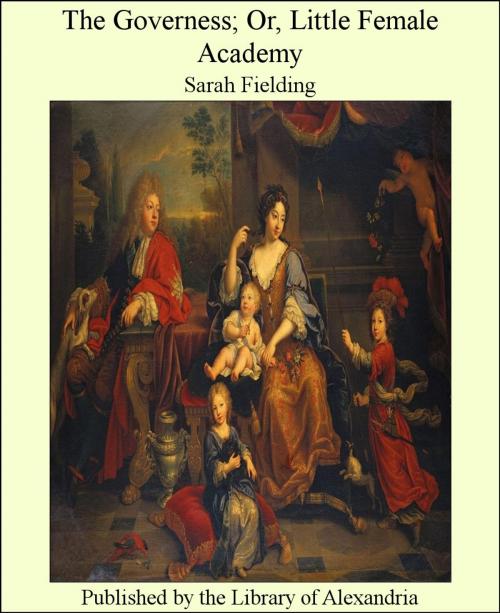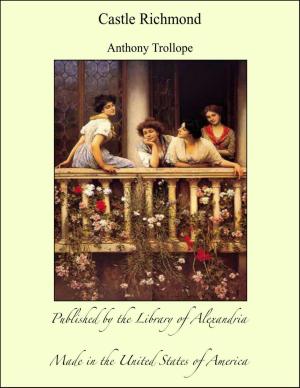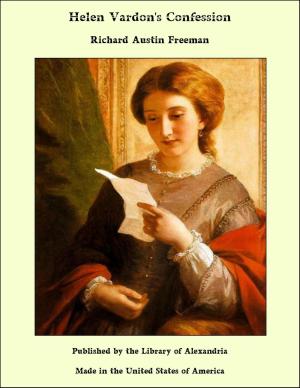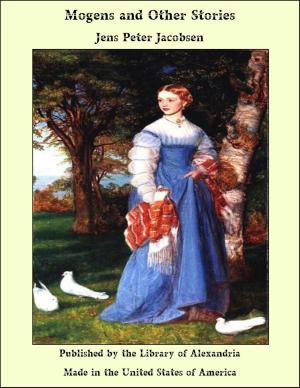The Governess; Or, Little Female Academy
Nonfiction, Religion & Spirituality, New Age, History, Fiction & Literature| Author: | Sarah Fielding | ISBN: | 9781465525666 |
| Publisher: | Library of Alexandria | Publication: | March 8, 2015 |
| Imprint: | Language: | English |
| Author: | Sarah Fielding |
| ISBN: | 9781465525666 |
| Publisher: | Library of Alexandria |
| Publication: | March 8, 2015 |
| Imprint: | |
| Language: | English |
There lived in the northern parts of England, a gentlewoman who undertook the education of young ladies; and this trust she endeavoured faithfully to discharge, by instructing those committed to her care in reading, writing, working, and in all proper forms of behaviour. And though her principal aim was to improve their minds in all useful knowledge; to render them obedient to their superiors, and gentle, kind, and affectionate to each Other; yet did she not omit teaching them an exact neatness in their persons and dress, and a perfect gentility in their whole carriage. This gentlewoman, whose name was Teachum, was the widow of a clergyman, with whom she had lived nine years in all the harmony and concord which forms the only satisfactory happiness in the married state. Two little girls (the youngest of which was born before the second year of their marriage was expired) took up a great part of their thoughts; and it was their mutual design to spare no pains or trouble in their education. Mr. Teachum was a very sensible man, and took great delight in improving his wife; as she also placed her chief pleasure in receiving his instructions. One of his constant subjects of discourse to her was concerning the education of children: so that, when in his last illness his physicians pronounced him beyond the power of their art to relieve him, he expressed great satisfaction in the thought of leaving his children to the care of so prudent a mOther. Mrs. Teachum, though exceedingly afflicted by such a loss, yet thought it her duty to call forth all her resolutions to conquer her grief, in order to apply herself to the care of these her dear husband's children. But her misfortunes were not here to end: for within a twelvemonth after the death of her husband, she was deprived of both her children by a violent fever that then raged in the country; and, about the same time, by the unforeseen breaking of a banker, in whose hands almost all her fortune was just then placed, she was bereft of the means of her future support. The Christian fortitude with which (through her husband's instructions) she had armed her mind, had not left it in the power of any outward accident to bereave her of her understanding, or to make her incapable of doing what was proper on all occasions. Therefore, by the advice of all her friends, she undertook what she was so well qualified for; namely, the education of children. But as she was moderate in her desires, and did not seek to raise a great fortune, she was resolved to take no more scholars than she could have an eye to herself without the help of Other teachers; and instead of making interest to fill her school, it was looked upon as a great favour when she would take any girl. And as her number was fixed to nine, which she on no account would be prevailed on to increase, great application was made, when any scholar went away, to have her place supplied; and happy were they who could get a promise for the next vacancy
There lived in the northern parts of England, a gentlewoman who undertook the education of young ladies; and this trust she endeavoured faithfully to discharge, by instructing those committed to her care in reading, writing, working, and in all proper forms of behaviour. And though her principal aim was to improve their minds in all useful knowledge; to render them obedient to their superiors, and gentle, kind, and affectionate to each Other; yet did she not omit teaching them an exact neatness in their persons and dress, and a perfect gentility in their whole carriage. This gentlewoman, whose name was Teachum, was the widow of a clergyman, with whom she had lived nine years in all the harmony and concord which forms the only satisfactory happiness in the married state. Two little girls (the youngest of which was born before the second year of their marriage was expired) took up a great part of their thoughts; and it was their mutual design to spare no pains or trouble in their education. Mr. Teachum was a very sensible man, and took great delight in improving his wife; as she also placed her chief pleasure in receiving his instructions. One of his constant subjects of discourse to her was concerning the education of children: so that, when in his last illness his physicians pronounced him beyond the power of their art to relieve him, he expressed great satisfaction in the thought of leaving his children to the care of so prudent a mOther. Mrs. Teachum, though exceedingly afflicted by such a loss, yet thought it her duty to call forth all her resolutions to conquer her grief, in order to apply herself to the care of these her dear husband's children. But her misfortunes were not here to end: for within a twelvemonth after the death of her husband, she was deprived of both her children by a violent fever that then raged in the country; and, about the same time, by the unforeseen breaking of a banker, in whose hands almost all her fortune was just then placed, she was bereft of the means of her future support. The Christian fortitude with which (through her husband's instructions) she had armed her mind, had not left it in the power of any outward accident to bereave her of her understanding, or to make her incapable of doing what was proper on all occasions. Therefore, by the advice of all her friends, she undertook what she was so well qualified for; namely, the education of children. But as she was moderate in her desires, and did not seek to raise a great fortune, she was resolved to take no more scholars than she could have an eye to herself without the help of Other teachers; and instead of making interest to fill her school, it was looked upon as a great favour when she would take any girl. And as her number was fixed to nine, which she on no account would be prevailed on to increase, great application was made, when any scholar went away, to have her place supplied; and happy were they who could get a promise for the next vacancy











![Cover of the book [19th Century Actor] Autobiographies by Sarah Fielding](https://www.kuoky.com/images/2015/march/300x300/9781465503732-TEET_300x.jpg)



